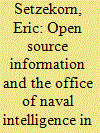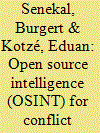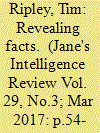| Srl | Item |
| 1 |
ID:
164199


|
|
|
|
|
| Summary/Abstract |
Where does British open source intelligence (OSINT) fit into the intelligence debate surrounding Allied knowledge of the Holocaust? In particular what can this source of intelligence tell us in regards to the opening of the extermination phase of the Holocaust in the Soviet Union? Were the Allies conclusions being falsely influenced by their own OSINT analysts? Or conversely did OSINT provide further evidence (alongside SIGINT decodes) that the Nazis were now committing mass genocide. This article explores these questions by examining the FRPS/FORD OSINT reports from the civilian ruled territories of (and those intended for) the Reichskommissariate Ostland and Ukraine.
|
|
|
|
|
|
|
|
|
|
|
|
|
|
|
|
| 2 |
ID:
104885


|
|
|
|
|
| Publication |
New Delhi, Manas Publications, 2011.
|
| Description |
248p.
|
| Standard Number |
9788170493990, hbk
|
|
|
|
|
|
|
|
|
|
|
|
Copies: C:1/I:0,R:0,Q:0
Circulation
| Accession# | Call# | Current Location | Status | Policy | Location |
| 056107 | 327.1273/DHA 056107 | Main | On Shelf | General | |
|
|
|
|
| 3 |
ID:
168619


|
|
|
|
|
| Summary/Abstract |
In the 1980s some thirty members of paramilitary groups in Northern Ireland both republican and loyalist, agreed to provide evidence against their former colleagues in return for a reduced sentence or immunity from prosecution, a new identity and life. Such individuals became commonly known as ‘supergrasses’. This article drawing on archival and documentary research explores the potential opportunity these supergrass trials provided for republican paramilitary groups to gather open source intelligence on their loyalist counterparts. It also tracks whether individuals named by loyalist supergrasses were subsequently targeted by opposing paramilitary groups on their acquittal or release from prison.
|
|
|
|
|
|
|
|
|
|
|
|
|
|
|
|
| 4 |
ID:
131051


|
|
|
|
|
| Publication |
2014.
|
| Summary/Abstract |
The role of open source intelligence (OSINT) has expanded greatly since 11 September 2001 (9/11) and the 2010-2011 Arab Spring as analysts and policymakers have struggled to understand the challenges and opportunities of globalized information. The contemporary trend toward open source collection and analysis is not fundamentally new in its methods, but rather marks a return to traditional methods of intelligence gathering that have been overlooked in favor of spy satellites, drones, and signal intercepts. Beginning in the early 1900s, the United States Office of Naval Intelligence (ONI) developed an extensive system of open source intelligence collection and analysis. The primary target of the ONI's efforts was the naval development of the Empire of Japan. An exploration of the connections between open source intelligence and the behavior of American negotiators at the Washington Naval Conference of 1921-1922 presents a historical setting for later developments.
|
|
|
|
|
|
|
|
|
|
|
|
|
|
|
|
| 5 |
ID:
168434


|
|
|
|
|
| Summary/Abstract |
With the advent of the information age, Open Source Intelligence (OSINT) has gained special prominence in the Intelligence Community (IC). However, the era of big data has brought numerous challenges in handling OSINT, in particular because big data comprise large volumes of unstructured data that are generated continuously. In this article, we discuss the use of OSINT in the era of big data, in particular how it relates to compiling event data, but also show that large projects with an international focus such as the Integrated Crisis Early Warning System (ICEWS) are inadequate to study political instability in the current South African context. We shift our collection efforts from mainstream media to the analysis of WhatsApp messages, since this platform has recently gained popularity and it is widely used in South Africa. We show how we build an automated data pipeline that provides near real time data on the occurrence of mass violence in South Africa. For this analysis, we make use of Natural Language Processing (NLP) toolkits in Python and build interactive dashboards to monitor the state of mass violence in South Africa.
|
|
|
|
|
|
|
|
|
|
|
|
|
|
|
|
| 6 |
ID:
163083


|
|
|
| 7 |
ID:
151799


|
|
|